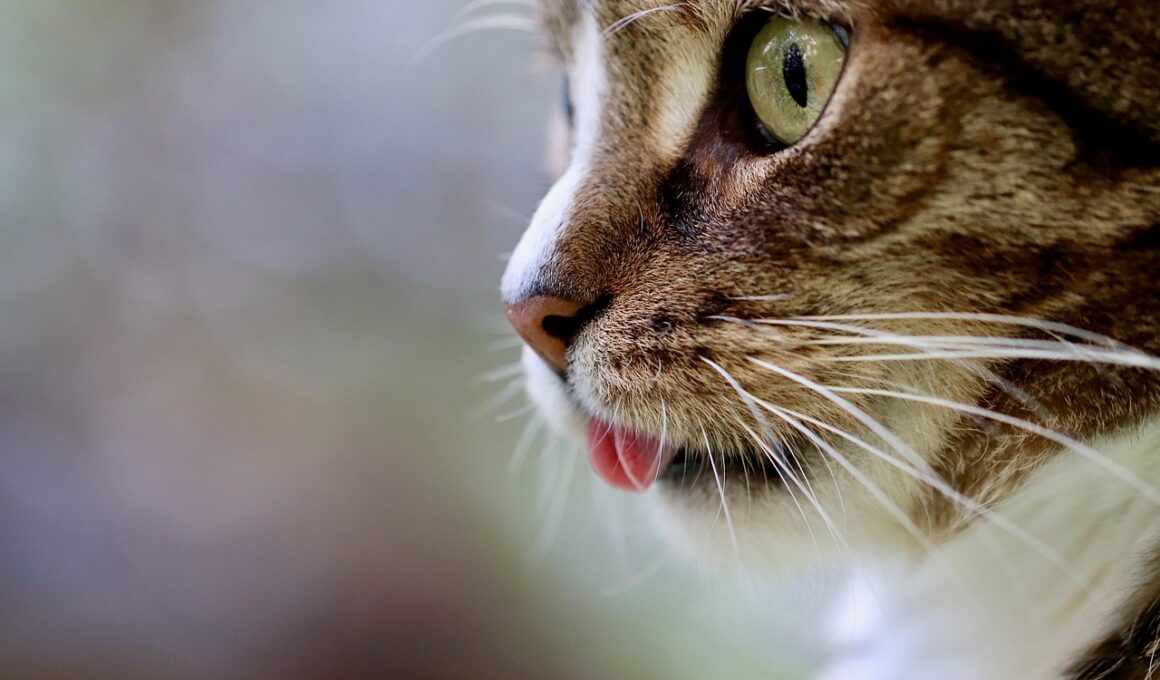Challenges in Conducting Feline Mental Health Research
Researching cat mental health is multifaceted and presents numerous challenges. Cats have complex behaviors that can be difficult to observe consistently, leading to the need for innovative research methodologies. Researchers must navigate various environmental factors and individual cat personalities, which can significantly influence the outcomes of studies. Traditional methods often fall short in accurately measuring stress and anxiety levels in felines. Researchers aim to utilize more nuanced approaches, such as behavioral observations and subjective owner reports, to address these gaps. Furthermore, the need for a standardized protocol for assessing feline mental health has become increasingly crucial. Diverse study designs and reporting standards can lead to conflicting results and difficulties in comparing findings. Collaborations across institutions remain necessary to gather a robust data pool. Obtaining participation from cat owners is also problematic, as many may be reluctant to engage in research due to concerns about privacy or animal welfare. It’s essential to provide comprehensive information about the studies to encourage involvement, ensuring participants understand the relevance and potential benefits their contributions might yield for feline mental health advancements. This approach can ultimately lead to better understanding and interventions in feline mental health.
One significant obstacle in feline mental health research is the reliance on subjective assessments. This damages the overall authenticity and scientific validity of findings. Observational tools often lack rigorous empirical backing, making them less dependable than desired. Consequently, researchers face hurdles in developing a universal framework that can accurately gauge mental health in cats. Consideration must be given to feline emotional states, which can vary based on a range of circumstances. Furthermore, environmental stressors such as changes in household structure, recent trauma, or other companion animals can skew research outcomes. Consequently, focusing on the individual cat’s stress responses is paramount, as well as its coping mechanisms. Gathering data without influencing natural behaviors poses an additional challenge due to the cats’ inherent wariness of unfamiliar settings and people. Incorporating methods that respect the cat’s comfort, such as using familiar environments or observing natural behaviors, is vital. The risk of biases is high when owners manage to interpret their pets’ behaviors. Researchers must ensure that methodologies minimize these biases, promoting more objective insights into the welfare and mental states of their subjects. Addressing these issues can help enhance the quality and reliability of findings within feline mental health studies.
The Role of Owner Understanding
Another crucial aspect of feline mental health research is the role of the owner’s understanding and perception. Cat owners often project their expectations onto their pets, which can complicate the interpretation of behavioral cues and emotional states. A common issue arises when owners misinterpret signs of stress as normal behavior, unknowingly skewing research results. This provides a distorted view of an individual’s mental status and continues to perpetuate misconceptions on feline behavior. Effective communication between researchers and cat owners is essential to eliminate these misunderstandings. Providing educational resources about feline body language and stress signals can help owners properly assess their cats’ emotional health. Engaging owners in training sessions on observation methods can promote more accurate reporting of behavioral changes. Additionally, creating surveys or apps that allow owners to record their cat’s behaviors over time could lead to valuable longitudinal data. Integrating owner involvement in the research journey can lead to improved participant retention and more reliable data collection. As owners become more educated about cat behavior, the quality of data collected will likely enhance, leading to breakthroughs in understanding feline mental health.
Fieldwork in feline mental health often involves challenges regarding accessibility to diverse cat populations. Gaining access to study participants requires navigating various barriers, such as geographical constraints or community awareness of research endeavors. In many cases, there can be a reluctance among the owner to allow their cats to be part of a study. Concerns typically center around their pets’ wellbeing or the misconceptions about invasive procedures involved in research. Thus, building trust with the cat owners starts as a critical step. Researchers can build relationships with local veterinarians and community organizations, which can facilitate participant recruitment. Furthermore, offering incentives or showing potential improvements resulting from the research findings can enhance participation rates. Inclusion of community-based initiatives and awareness campaigns can also help demystify the research process surrounding feline mental health. Additionally, targeting outreach efforts towards cat owners in diverse demographics aids in capturing a wider breadth of experiences. This broadened perspective can then enhance the data quality and provide insights that transcend specific breeds or environments, ultimately advancing our understanding of feline mental health challenges.
Ethical Considerations in Research
The ethical considerations involved in conducting feline mental health research also pose significant challenges. Researchers must always prioritize the welfare of cats, ensuring minimal risk and distress during the study periods. This necessitates a careful design and implementation of research protocols, as well as oversight from ethical review boards. Many owners fear that engaging in research could lead to harm or irreversible changes in their pet’s behavior. Therefore, dispelling these fears is essential for effective participant recruitment. In addition, responsible reporting of findings presents another ethical challenge. Researchers must carefully consider how results might be interpreted, particularly in media representations. Miscommunication, sensationalization, or misinterpretation of findings could further invalidate the public’s perception of feline mental health. Clear communication about results and limitations is essential for preserving the integrity of the research process. Collaboration with veterinary professionals in a broader academic context helps establish thorough protocols for ethically conducting research while ensuring animal welfare remains paramount. In addition, researchers should always consider the implications of their work and strive to create a positive impact on feline wellbeing and owners’ understanding of their pets’ mental health.
Innovative data collection methods can alleviate some of the challenges faced by researchers studying feline mental health. For instance, utilizing wearable technology allows real-time monitoring of cats’ stress and behavioral changes in their natural environments. By implementing non-invasive devices, researchers can gather more accurate and comprehensive data without influencing the cats’ behaviors. These devices can track various factors, such as heart rate variability and activity levels, providing valuable insights into emotional states. Additionally, advancements in technology can facilitate interactive platforms for owners to report observations and assessments more efficiently. Virtual data collection tools can simplify participation by allowing owners to share information via smartphones or tablets. This innovative approach reduces the need for in-person visits, making studies more accessible for all participants while maintaining data integrity. Furthermore, ensuring that technology is user-friendly and provide adequate training opportunities for owners contributes to higher engagement rates. Fostering a supportive community around feline mental health research encourages owners to participate actively, ultimately leading to more substantial contributions to the field. By staying adaptable and open to new methodologies, researchers can better address challenges present in existing practices while promoting the mental health of our feline companions.
Potential for Future Advancements
Looking forward, the landscape of feline mental health research is ripe for growth and advancements. Collaborations between veterinary professionals, behavioral scientists, and pet owners can invigorate research initiatives, merging diverse perspectives and knowledge bases to generate impactful findings. As researchers continue to recognize the importance of community involvement in addressing these challenges, new methodologies and research paradigms will emerge. Integrating traditional observations with advanced monitoring technologies can reshape our understanding of feline wellbeing. Encouraging a multidisciplinary approach that incorporates psychology, veterinary science, and environmental studies might yield transformative insights. More studies focusing on various aspects such as human-animal interactions, stress reduction techniques, and behavioral enrichment provide a path toward enhanced understanding. Ultimately, the future of feline mental health research will depend heavily on collaboration, ethical considerations, and commitment from all involved stakeholders. By prioritizing and investing in feline mental health, humans can promote not only their pets’ comfort but also societal attitudes toward animal welfare. The growing interest in animal mental health signifies a promising era where improvements in feline research methodologies can translate into tangible benefits for our cherished companions.
Advancing feline mental health research requires examining the efficacy of existing frameworks and methodologies while constantly questioning established norms. Such reflections drive innovation and new ideas that can better serve feline populations. Researchers should strive for the ongoing refinement of assessment tools and consider the unique traits of feline behavior while designing studies. As knowledge in feline psychology progresses, researchers can prioritize their engagement with the larger community to facilitate awareness, education, and advocacy. Building a more informed interaction between pet owners and scientific communities will foster collective progress toward better practices. Ultimately, the challenges inherent in conducting feline mental health research highlight the need for collaboration, innovation, and an ethical approach. Through dedication and exploration, the field can evolve to better cater to the complexities of cat behaviors, leading to enhanced understanding and improved welfare. This harmony between academia, veterinary practices, and pet owners promises to make significant strides in understanding cat mental health, thus enriching the lives of both cats and their human companions. Such advancements will contribute positively to the well-being of cats, ensuring they lead happier, healthier lives while also increasing societal awareness regarding their mental health needs.





